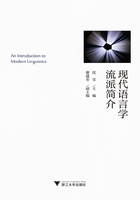
1.5 Major Distinctions Between Language and Linguistics
1) Form and meaning (function): If you approach language from formal perspective, you will belong to a formal school; if you look at language from a functional point of view, you will belong to a functional school. They are the two most important aspects of language until recently—cognition comes into the picture.
2) Prescriptive, descriptive & explanatory: You are being prescriptive if telling people what language ought to be; you lay down rules for it. If you say language is whatever is spoken in the speech community, you are then being descriptive. You don't just describe what language is like but also try to explain why it is like that, then you are trying to be explanatory.
3) Synchronic and diachronic studies: Language exists in time and changes over time. If you study language at a particular point in time, that is synchronic linguistics. If you study language across time, that is, at several language states, then that is diachronic linguistics. But it is only logical that synchronic studies come before diachronic studies.
4) Psychological divide: behaviorist and mentalist psychology (later cognitive psychology). Behaviorism is the belief that the study of mind should only be based on people's behavior. Mentalism is the belief that a human being possesses a mind which has consciousness, ideas, etc., and that mind can influence the behavior of the body.
5) Philosophical divide: empiricism and rationalism. Empiricism is the belief that the development of theory must be related to observable facts and experiments or that all human knowledge comes from experience. It contrasts with the view that many forms of human knowledge are inborn or innate (innatist hypothesis, which says that knowledge develops from ideas in the mind at birth rather than from the environment).
Questions for further studying
1. One of the main features of our human languages is arbitrariness. Can you briefly explain what this feature refers to? Support your argument with examples.
2. What is the difference between language and linguistics? Prescriptive and descriptive approaches to language? Synchronic and diachronic linguistics? Form and meaning? Empiricism and rationalism? Behaviorist and mentalist psychology?
3. Tell the differences between Schools and Branches according to modern linguistics.
4. How do you understand that language is a scientific system?
5. What are the design features of language?
References
1. Bloomfield, L. Language. New York: Holt, Rinehart & Winston, 1993.
2. Hockett, C.F. A Course in Modern Linguistics. Hampshire: MacMillan, 1958.
3.刘润清.西方语言学流派.北京:外语教学与研究出版社,1988.
4.刘润清,封宗信.语言学理论与流派.南京:南京师范大学出版社,2002.
5.刘润清,文旭.新编语言学教程.北京:外语教学与研究出版社,2005.
6.刘润清,崔刚.现代语言学名著选读.北京:外语教学与研究出版社,2009.